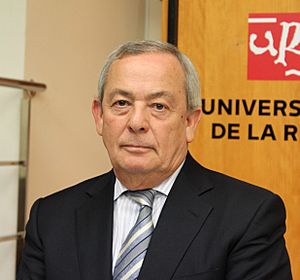Carlos Solchaga facts for kids
Quick facts for kids
Carlos Solchaga
|
|
|---|---|
 |
|
| Minister of Economy and Finance | |
| In office July 1985 – 1993 |
|
| Prime Minister | Felipe González |
| Preceded by | Miguel Boyer |
| Succeeded by | Pedro Solbes |
| Minister of Industry and Energy | |
| In office 1982 – July 1985 |
|
| Prime Minister | Felipe González |
| Personal details | |
| Born |
Carlos Solchaga Catalán
28 March 1944 Tafalla (Navarre), Spain |
| Political party | Socialist Party (Until 1994) |
| Alma mater | |
Carlos Solchaga is a Spanish economist and politician. He was born on March 28, 1944. He held important roles in the Spanish government.
Contents
Early Life and Learning
Carlos Solchaga was born in Tafalla, Spain, in 1944. He studied economics and business. In 1966, he earned his bachelor's degree. He graduated from Complutense University of Madrid. Later, in 1971, he received a master's degree. This was from the The Massachusetts Institute of Technology.
A Career in Politics
Carlos Solchaga started his career at the Bank of Spain. From 1976 to 1979, he advised Banco de Vizcaya. He then served as a trade minister. This was for the Basque general council from 1979 to 1980.
Serving in Parliament
From 1980 to 1995, he was a member of the Spanish Parliament. He represented the Navarre Province. Solchaga was part of the Socialist Party. He helped create the party's economic plans.
Becoming a Minister
His first big government job was Minister for Industry and Energy. He held this role from 1982 to 1985. This was during the first government of Prime Minister Felipe González.
In July 1985, he became the Minister of Economy and Finance. He took over from Miguel Boyer. He continued in this role in the next government led by Prime Minister González.
Leaving Government
Carlos Solchaga resigned from his position in July 1993. This was due to a public issue. It involved the activities of Mariano Rubio, who was the head of the Bank of Spain. This event was known as the Ibercorp case. Pedro Solbes then became the new finance minister.
After leaving his ministerial role, Solchaga became the Socialist Party's leader in Parliament. However, he slowly became less involved in party decisions. In 1994, he left the party.
International Role
In 1991, Solchaga was chosen for an important international role. He became the chairman of a committee for the International Monetary Fund. His term ended in September 1993. Philippe Maystadt, Belgium's finance minister, took over from him.
Work in Private Sector
After his time in government, Solchaga began working in private business. Since 1999, he has been an international consultant. He works for Solchaga and Recio Asociados. He is also the chairman of the Euroamerica Foundation. Additionally, he is the vice-chairman of the Reina Sofia National Museum. He serves on the boards of several other organizations.
See also
 In Spanish: Carlos Solchaga para niños
In Spanish: Carlos Solchaga para niños
 | Audre Lorde |
 | John Berry Meachum |
 | Ferdinand Lee Barnett |

